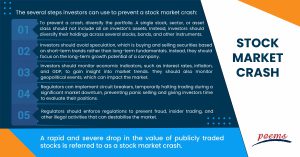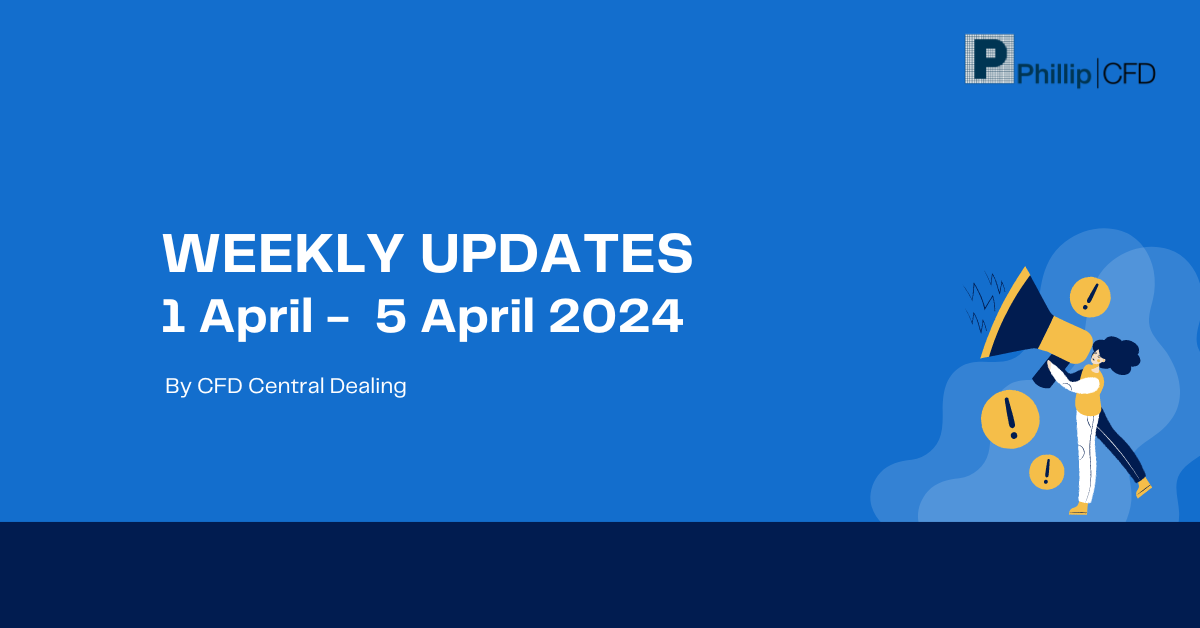Stock market crash
Table of Contents
Stock market crash
The stock market, which is frequently seen as a sign of economic success, represents the capacity for businesses to raise cash and for investors to get a return on their investments. The stock market does, however, have certain inherent dangers. Volatility and crashes can significantly negatively impact portfolios, causing significant financial losses for people, businesses, and even the economy as a whole.
From the great depression of the 1930s to the Dot-com Bubble of the early 2000s, history is rife with examples of stock market crashes and their terrible consequences. It is crucial to comprehend the risks related to the stock market because such calamities can have long-lasting effects that linger for years or even decades.
What is a stock market crash?
A rapid and severe drop in the value of publicly traded stocks is referred to as a stock market crash. The collapse typically happens when there is widespread panic selling by investors, which causes stock values to plummet significantly. Various circumstances, such as economic downturns, geopolitical unrest, shifts in investor mood, and problems with the systemic financial system, can cause stock markets. The economy may be affected in multiple ways by a stock market fall, including decreased employment, company investment, and consumer spending. It may also result in large financial losses for investors and businesses.
Understanding stock market crashes
Stock market crashes are complicated and often challenging to comprehend. Investors panic and sell off their holdings during a crash, driving down stock prices. This may trigger a vicious selling cycle in which many investors sell their shares. Stock market crashes can greatly affect the economy, leading to corporate failures, job losses, and a fall in consumer spending. Investors and governments must comprehend the causes and effects of stock market crashes.
Preventing a stock market crash
The several steps investors can use to prevent a stock market crash:
- To prevent a crash, diversify the portfolio. A single stock, sector, or asset class should not include all an investor’s assets. Instead, investors should diversify their holdings across several stocks, bonds, and other instruments.
- Investors should avoid speculation, which is buying and selling securities based on short-term trends rather than long-term fundamentals. Instead, they should focus on the long-term growth potential of a company.
- Investors should monitor economic indicators, such as interest rates, inflation, and GDP, to gain insight into market trends. They should also monitor geopolitical events, which can impact the market.
- Regulators can implement circuit breakers, temporarily halting trading during a significant market downturn, preventing panic selling and giving investors time to evaluate their positions.
- Regulators should enforce regulations to prevent fraud, insider trading, and other illegal activities that can destabilise the market.

Causes of a stock market crash
There are several reasons why a stock market crash can occur are:
- A stock market collapse can happen during a recession when companies and consumers have financial difficulties, resulting in a drop in demand for goods and services and a subsequent decline in stock prices.
- Interest rates may significantly impact the stock market. A decrease in the stock market might result from investors shifting their funds from stocks to bonds or other investments that give higher yields when interest rates rise.
- Speculation occurs when investors buy stocks hoping to make a quick profit rather than investing in a company’s long-term growth. If too many investors engage in speculation, it can lead to a bubble that eventually bursts, causing a crash.
- Corporate scandals, such as accounting fraud or insider trading, can cause investors to lose confidence in a company, leading to decreased stock prices.
- Geopolitical events, such as war or political instability, can cause uncertainty and volatility in the stock market, leading to a crash.
- Supply networks can be damaged by natural disasters like hurricanes, earthquakes, or pandemics, creating economic uncertainty and a drop in stock values.
- Sometimes stocks can become overvalued, meaning their prices are higher than their actual worth. This can occur when investors become overly optimistic about a company’s growth prospects, leading to a bubble that eventually bursts.
Examples of stock market crash
For example, the peak of the world financial crisis in 2008 saw a stock market meltdown. The crisis, which affected the entire global financial system, was caused by the subprime mortgage crisis in the United States.
Stock market losses were frequent due to investors’ growing scepticism over the dependability of banks and other financial organisations. Compared to its 2007 peak, the Dow Jones Industrial Average fell 33.8%, and some investors suffered substantial losses. While causing a global recession, the crisis demonstrated how intertwined the financial system is. Additionally, it compelled lawmakers to enact new rules intended to avert similar financial catastrophes in the future.
Frequently Asked Questions
While it is impossible to prevent a sudden market crash completely, some measures can help reduce the risk of such an event. These include implementing safeguards such as circuit breakers, improving transparency and oversight, and diversifying investments. Additionally, proactive risk management strategies can help investors and businesses mitigate the impacts of a potential crash.
Stock market crashes are typically characterised by rapid declines in stock prices, high levels of trading activity, and widespread panic among investors. Crashes can be triggered by various factors, including economic downturns, corporate scandals, and geopolitical events, and can significantly impact the broader economy.
History’s most famous stock market crashes include:
- The Wall Street crash of 1929
- The Black Monday crash of 1987
A circuit breaker is a regulatory mechanism designed to halt trading in a particular market in the event of significant price declines. When triggered, circuit breakers pause trading for a set period to allow investors to reassess their positions and prevent a complete market meltdown.
When a stock market crashes, investors experience significant financial losses as stock prices decline rapidly. This can lead to widespread panic and a sell-off of stocks, further exacerbating the decline. Businesses may also suffer, as declining stock prices can impact their ability to raise capital and access credit.
Related Terms
- Payment Date
- Treasury Stock Method
- Reverse stock splits
- Ticker
- Restricted strict unit
- Gordon growth model
- Stock quotes
- Shadow Stock
- Margin stock
- Dedicated Capital
- Whisper stock
- Voting Stock
- Deal Stock
- Microcap stock
- Capital Surplus
- Payment Date
- Treasury Stock Method
- Reverse stock splits
- Ticker
- Restricted strict unit
- Gordon growth model
- Stock quotes
- Shadow Stock
- Margin stock
- Dedicated Capital
- Whisper stock
- Voting Stock
- Deal Stock
- Microcap stock
- Capital Surplus
- Multi-bagger Stocks
- Shopped stock
- Secondary stocks
- Screen stocks
- Quarter stock
- Orphan stock
- One-decision stock
- Repurchase of stock
- Half stock
- Stock options
- Stock split
- Foreign exchange markets
- Stock Market
- FAANG stocks
- Unborrowable stock
- Joint-stock company
- Over-the-counter stocks
- Watered stock
- Zero-dividend preferred stock
- Bid price
- Authorised shares
- Auction markets
- Market capitalisation
- Arbitrage
- Market capitalisation rate
- Garbatrage
- Autoregressive
- Stockholder
- Penny stock
- Noncyclical Stocks
- Hybrid Stocks
- Large Cap Stocks
- Mid Cap Stocks
- Common Stock
- Preferred Stock
- Small Cap Stocks
- Earnings Per Share (EPS)
- Diluted Earnings Per Share
- Dividend Yield
- Cyclical Stock
- Blue Chip Stocks
- Averaging Down
Most Popular Terms
Other Terms
- Settlement currency
- Federal funds rate
- Active Tranche
- Convertible Securities
- Synthetic ETF
- Physical ETF
- Initial Public Offering
- Buyback
- Secondary Sharing
- Bookrunner
- Notional amount
- Negative convexity
- Jumbo pools
- Inverse floater
- Forward Swap
- Underwriting risk
- Reinvestment risk
- Final Maturity Date
- Secondary Market
- Margin Requirement
- Mark-to-market
- Pledged Asset
- Yield Pickup
- Subordinated Debt
- Trailing Stops
- Stochastic Oscillator
- Bullet Bonds
- Basket Trade
- Contrarian Strategy
- Exchange Control
- Notional Value
- Relevant Cost
- Dow Theory
- Speculation
- Stub
- Trading Volume
- Going Long
- Pink sheet stocks
- Rand cost averaging
- Sustainable investment
- Stop-limit sell order
- Economic Bubble
- Ask Price
- Constant prepayment rate
- Covenants
- Stock symbol
- Companion tranche
- Synthetic replication
- Bourse
- Beneficiary
Know More about
Tools/Educational Resources
Markets Offered by POEMS
Read the Latest Market Journal

In the diverse and complex world of investing, unit trusts stand out as a popular...

Back in Business: The Return of IPOs & Top Traded Counters in March 2024
Start trading on POEMS! Open a free account here! At a glance: Major indices continue...

Weekly Updates 15/4/24 – 19/4/24
This weekly update is designed to help you stay informed and relate economic and company...

From $50 to $100: Unveiling the Impact of Inflation
In recent years, inflation has become a hot topic, evoking strong emotions as the cost...

Japan’s Economic Resurgence: Unveiling the Tailwinds Behind Nikkei 225’s Record Leap
Source: eSignal, Intercontinental Exchange, Inc. In the heart of Japan’s economic landscape, the Nikkei 225...

Weekly Updates 8/4/24 – 12/4/24
This weekly update is designed to help you stay informed and relate economic and...

What Makes Forex Trading Attractive?
In a world where the click of a button can send goods across oceans and...

Weekly Updates 1/4/24 – 5/4/24
This weekly update is designed to help you stay informed and relate economic and company...












